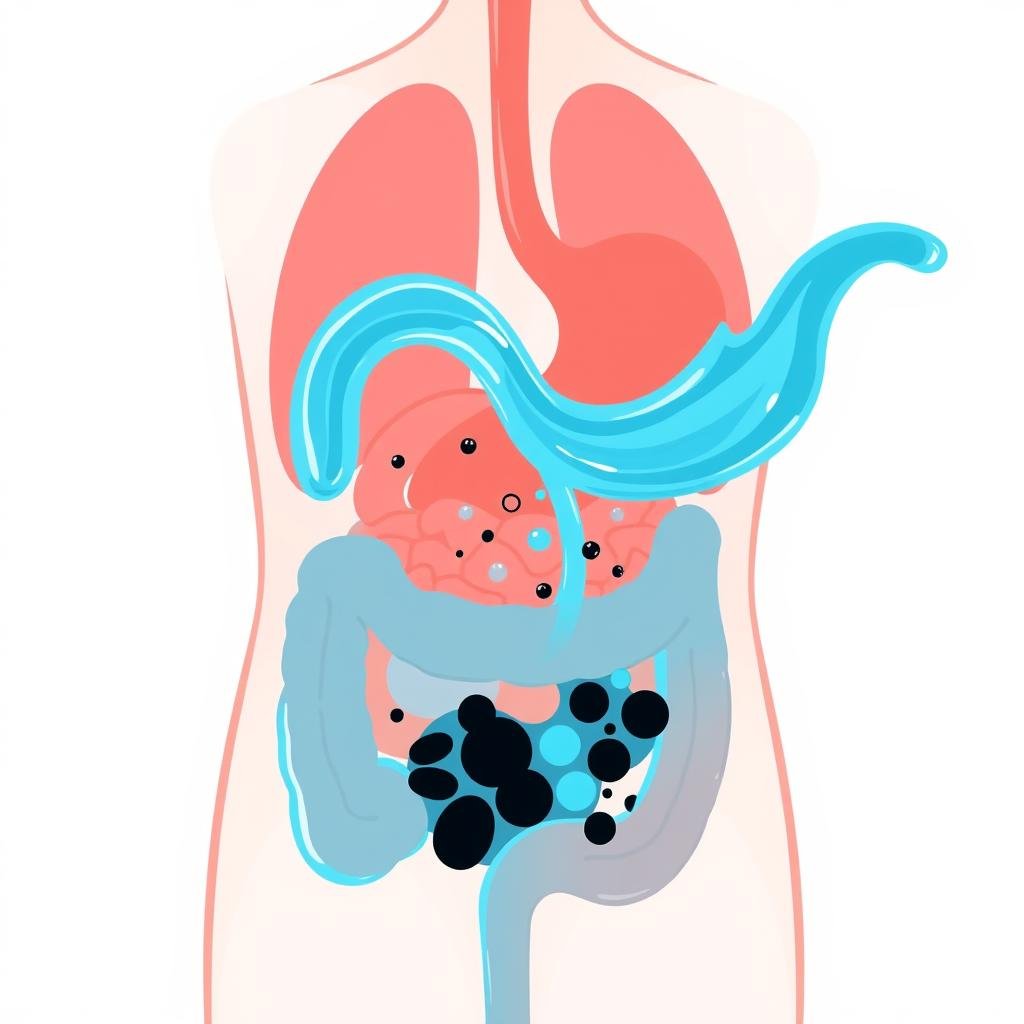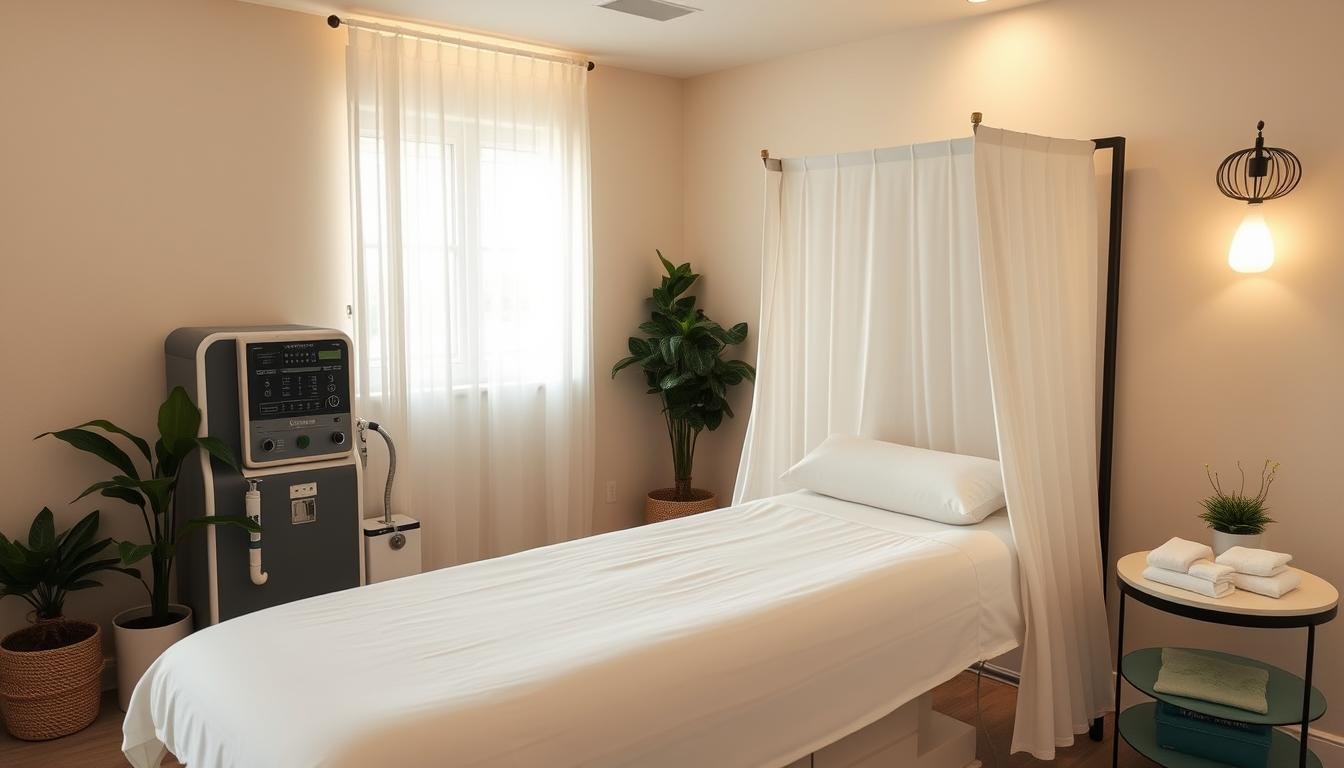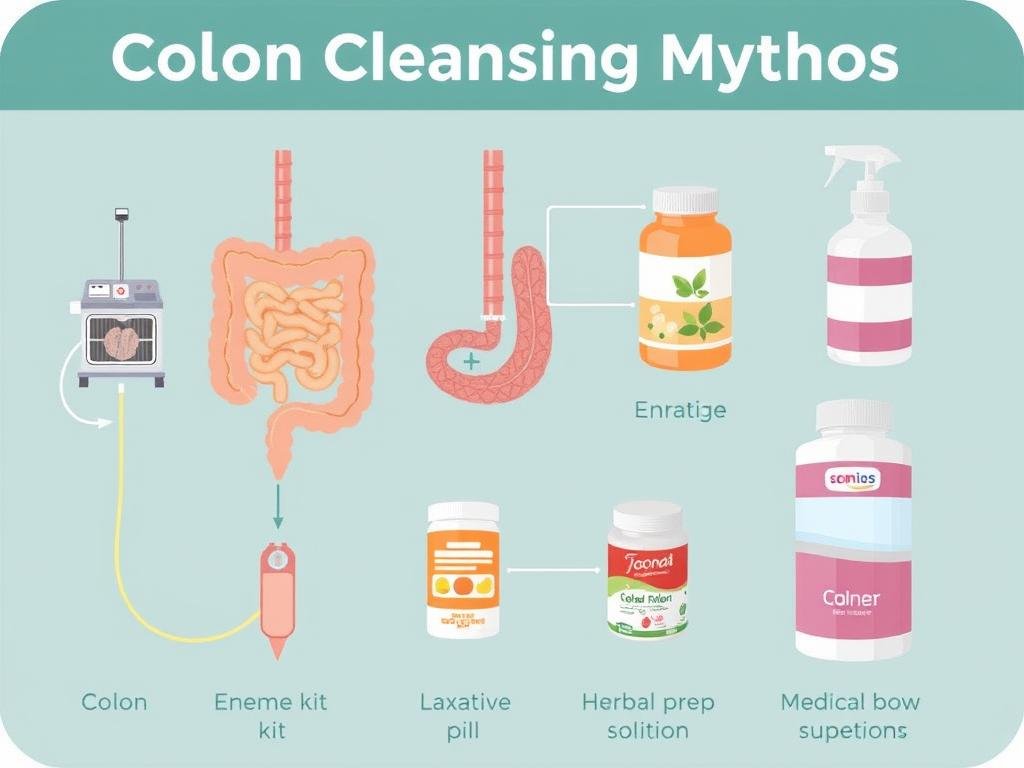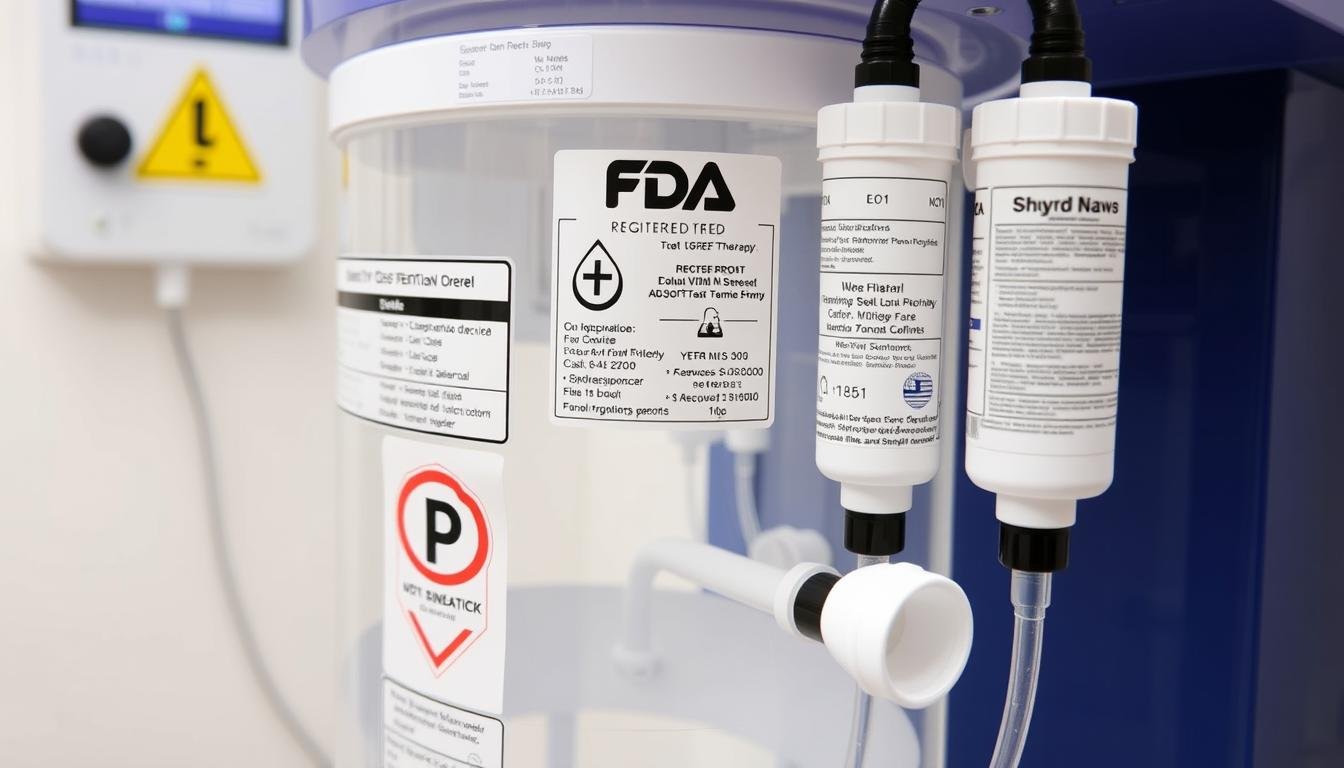Colon hydrotherapy treatment, also known as colonics or colon irrigation, has gained attention as a method for cleansing the large intestine. This procedure uses purified water to gently flush the colon, potentially removing accumulated waste and toxins. While some view it as an effective detoxification method, others question its necessity and safety. This comprehensive guide explores what colon hydrotherapy involves, its potential benefits and risks, and what you can expect if you’re considering this treatment.
What is Colon Hydrotherapy and How Does It Work?
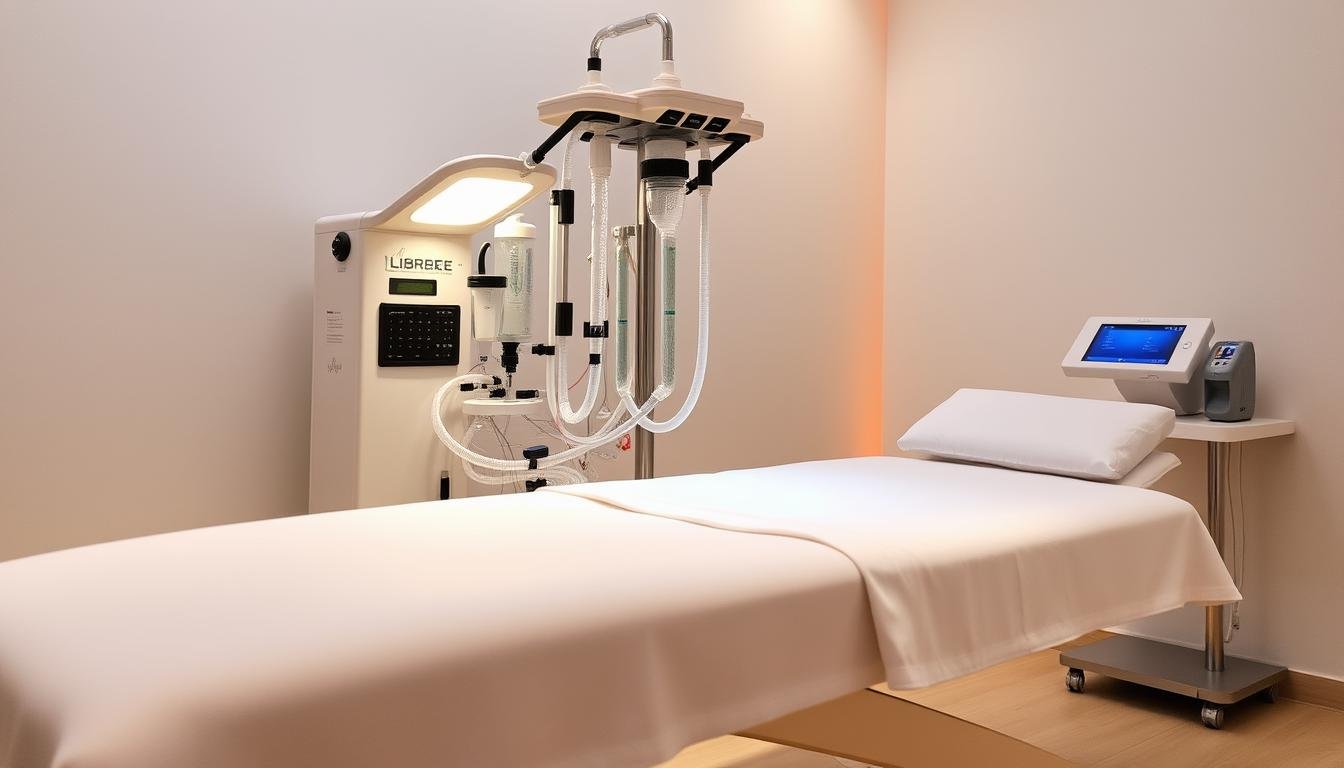
Modern colon hydrotherapy equipment with advanced filtration system
Colon hydrotherapy is a controlled method of cleansing the entire length of the large intestine (colon) using purified water. Unlike standard enemas that focus only on the lower portion of the colon, hydrotherapy aims to cleanse the full colon from the rectum to the cecum.
The Procedure Mechanics
During colon hydrotherapy treatment, filtered water is gently introduced into the colon through a small, disposable rectal tube. The water helps soften and break down waste material that may have accumulated on the intestinal walls. This waste is then naturally eliminated through a closed waste disposal system, preventing any odor or mess during the procedure.
Most modern clinics use FDA-registered equipment with temperature and pressure controls to ensure safety and comfort. The LIBBE system, for example, is an open system that uses gravity-fed water flow and a double filtration process for optimal safety.
Open vs. Closed Systems
Colon hydrotherapy equipment generally falls into two categories:
- Open Systems: The client has more control and privacy. After the therapist helps position the client and start the water flow, the client can often be left alone to release waste as needed.
- Closed Systems: The therapist remains present throughout the session, controlling water flow and sometimes using abdominal massage to facilitate waste release.
Water Filtration and Safety
Quality hydrotherapy systems employ multiple safety features:
- Double or triple water filtration systems
- UV light sterilization of water
- Disposable, single-use rectal tubes and equipment
- Backflow prevention valves
- Temperature and pressure regulation
Potential Benefits of Colon Hydrotherapy
Proponents of colon hydrotherapy treatment suggest several potential benefits, though it’s important to note that scientific evidence for many of these claims remains limited. Here are the commonly reported benefits:
Digestive Improvements
Many clients report relief from digestive complaints such as constipation, bloating, and gas. Colon hydrotherapy may help improve bowel regularity and ease symptoms of irritable bowel syndrome in some individuals.
Detoxification Support
By removing accumulated waste material, colon hydrotherapy may support the body’s natural detoxification processes. This could potentially reduce the reabsorption of toxins through the intestinal wall into the bloodstream.
Increased Energy
Some clients report feeling lighter and more energetic after sessions. Advocates suggest this may result from reduced toxin burden and improved nutrient absorption.
Improved Colon Muscle Tone
Regular sessions may help exercise the colon, potentially improving its natural peristaltic (muscle contraction) action and helping to restore normal bowel function in cases of chronic constipation.
Enhanced Hydration
The colon plays a key role in water absorption. Hydrotherapy may help restore optimal hydration levels in the body by improving the colon’s ability to absorb water efficiently.
Improved Skin Clarity
Some practitioners suggest that removing toxins from the body through colon cleansing may result in clearer skin and reduced acne, though this connection requires more research.
Experience the Benefits Yourself
Curious about how colon hydrotherapy might help with your specific health concerns? Consult with a certified professional to learn more about personalized treatment options.
Find a Certified Hydrotherapist
Risks and Contraindications

Understanding potential risks is essential before undergoing treatment
While many people undergo colon hydrotherapy without complications, the procedure is not without risks. It’s crucial to understand these potential risks and know when the treatment is contraindicated.
Safety Considerations
- Choose only certified, experienced practitioners
- Ensure equipment is FDA-registered with proper sterilization
- Disclose full medical history before treatment
- Follow all pre and post-treatment guidelines
- Stay hydrated before and after sessions
Potential Risks
- Electrolyte imbalance from excessive fluid loss
- Perforation of the bowel (rare but serious)
- Infection from improperly sterilized equipment
- Disruption of normal gut flora
- Dependency with excessive use
Absolute Contraindications
Colon hydrotherapy treatment is not appropriate for everyone. You should not undergo this procedure if you have any of the following conditions:
- Recent abdominal or colorectal surgery
- Active inflammatory bowel disease (Crohn’s, ulcerative colitis)
- Diverticulitis
- Intestinal perforations
- Severe hemorrhoids or anal fissures
- Abdominal hernia
- Severe cardiac conditions
- Renal insufficiency
- Liver cirrhosis
- Pregnancy
- Colon or rectal cancer
- Severe anemia
Important: Always consult with your healthcare provider before undergoing colon hydrotherapy, especially if you have any existing health conditions or are taking medications. This treatment should complement, not replace, conventional medical care.
The Colon Hydrotherapy Procedure: What to Expect
Understanding what happens during a colon hydrotherapy session can help ease anxiety about the procedure. Here’s a step-by-step breakdown of what you can typically expect:
Before Your Appointment
- Consultation: Most reputable practitioners will conduct an initial health assessment and explain the procedure in detail.
- Preparation: You’ll typically be advised to avoid heavy meals for 2 hours before your appointment. Some practitioners recommend lighter eating for 24-48 hours prior.
- Hydration: Drinking plenty of water before your session is usually recommended.
- Paperwork: You’ll complete forms detailing your medical history and acknowledging the procedure’s risks and benefits.
During the Session
- Private Environment: You’ll be shown to a private treatment room with a specialized hydrotherapy device.
- Positioning: You’ll lie on your back on a treatment table that has an opening or basin underneath for waste elimination.
- Insertion: After the therapist leaves the room, you’ll insert a small, disposable rectal tube (about the size of a pencil) yourself, or in some cases, the therapist may assist.
- Water Flow: Filtered, temperature-controlled water will gently flow into your colon. The therapist may adjust the temperature and pressure for comfort.
- Release: When you feel the urge, you’ll release the water and waste naturally through the tube and into the closed system.
- Repeat: This process of filling and releasing continues throughout the session, gradually cleansing different parts of the colon.
- Massage: Some therapists may offer abdominal massage to help release stubborn waste.
After the Procedure
- Restroom Visit: You’ll typically use the bathroom to ensure complete elimination.
- Hydration: You’ll be offered water or electrolyte drinks to rehydrate.
- Discussion: The therapist may discuss observations about your session and make recommendations.
- Rest: Some people feel energized immediately, while others may need to rest briefly.
Session Duration: A typical first-time colon hydrotherapy treatment lasts 60-90 minutes, with subsequent sessions usually taking 45-60 minutes. The actual water flow portion usually lasts 30-45 minutes.
Prepare for Your First Session
Want to ensure the best experience for your colon hydrotherapy treatment? Download our comprehensive preparation guide with dietary recommendations and tips.
Download Pre-Treatment Guide
Colon Hydrotherapy vs. Other Cleansing Methods
Colon hydrotherapy is just one of several approaches to colon cleansing. Understanding how it compares to other methods can help you determine which might be most appropriate for your needs.
| Method |
Description |
Depth of Cleansing |
Professional Supervision |
Time Investment |
Cost Range |
| Colon Hydrotherapy |
Uses filtered water to cleanse the entire colon |
Full colon (ascending, transverse, descending) |
Required |
45-90 minutes per session |
$80-$150 per session |
| Enemas |
Home-administered water or solution retained briefly |
Lower colon only (sigmoid, rectum) |
Not required |
15-30 minutes |
$5-$30 for kit |
| Laxatives |
Oral medications that stimulate bowel movements |
Varies by product |
Not required |
Hours to overnight |
$5-$20 |
| Herbal Cleansing |
Supplements with fiber, herbs, and probiotics |
Entire digestive tract |
Recommended |
Days to weeks |
$20-$100 for program |
| Bowel Prep (Medical) |
Strong laxatives for colonoscopy preparation |
Entire colon |
Required |
12-24 hours |
Part of procedure cost |
Key Differences
Colon Hydrotherapy vs. Enemas
While both use water to cleanse the colon, colon hydrotherapy reaches much further into the colon than standard enemas. Enemas typically cleanse only the rectum and sigmoid colon, while hydrotherapy can reach the transverse and ascending colon. Additionally, hydrotherapy uses a continuous flow system rather than a single fill-and-release approach.
Colon Hydrotherapy vs. Laxatives
Laxatives work by stimulating the intestinal muscles or drawing water into the bowel to promote evacuation. Unlike hydrotherapy, they don’t introduce water directly into the colon. Laxatives can be harsh on the digestive system and may cause dependency with regular use, while properly administered hydrotherapy is generally gentler.
Safety Considerations and FDA Stance
When considering colon hydrotherapy treatment, understanding the regulatory landscape and safety guidelines is essential for making an informed decision.
FDA Regulation
The U.S. Food and Drug Administration (FDA) classifies colon irrigation systems as Class II medical devices. This means:
- The equipment itself is regulated and must meet certain safety standards
- Manufacturers must register their devices and follow quality control procedures
- The FDA does not, however, regulate the practice of colon hydrotherapy itself
- The FDA has issued warning letters to some manufacturers making unsubstantiated health claims
“While the FDA regulates colon irrigation devices when they are used for medical purposes, we are concerned about the potential for injury when these devices are used for unapproved uses.”
— FDA statement on colon cleansing devices
Medical Perspective
The mainstream medical community generally views colon hydrotherapy with caution. Major medical organizations note:
- The colon naturally eliminates waste and bacteria
- There is limited scientific evidence supporting many claimed benefits
- Potential risks should be carefully weighed against potential benefits
- It may be appropriate in specific medical contexts (e.g., before certain diagnostic procedures)
Ensuring Safe Treatment
If you choose to pursue colon hydrotherapy, these safety guidelines can help minimize risks:
Practitioner Qualifications
- Choose therapists certified by recognized organizations like I-ACT (International Association for Colon Hydrotherapy) or NBCHT (National Board for Colon Hydrotherapy)
- Verify they have proper training and experience
- Ask about their infection control protocols
- Ensure they conduct thorough health screenings
Facility Standards
- Equipment should be FDA-registered
- Facilities should be clean and professional
- Disposable components should be used for each client
- Water filtration systems should be in place
- Emergency protocols should be established
Find Accredited Practitioners
Safety should be your top priority when considering colon hydrotherapy. Connect with certified practitioners who adhere to strict safety protocols and use FDA-registered equipment.
Locate Accredited Centers
Frequently Asked Questions About Colon Hydrotherapy

How often should I have colon hydrotherapy sessions?
Frequency recommendations vary based on individual health goals and conditions. For those new to colon hydrotherapy, practitioners often suggest an initial series of 2-3 sessions spaced about a week apart to achieve a thorough cleansing. After that, maintenance sessions might be scheduled monthly, quarterly, or as needed.
It’s important to work with your practitioner to develop a personalized schedule that addresses your specific health concerns without creating dependency on the treatment.
Does colon hydrotherapy hurt?
Most people do not find colon hydrotherapy painful. You may experience mild discomfort, pressure, or cramping as water enters the colon and waste is released, but this is typically brief. Modern equipment allows for temperature and pressure adjustments to maximize comfort.
If you experience significant pain during the procedure, it should be stopped immediately, as pain could indicate a contraindication or complication.
Will colon hydrotherapy disrupt my gut bacteria?
Colon hydrotherapy does remove some intestinal flora, both beneficial and harmful. However, the body typically reestablishes bacterial balance naturally within a short period. Some practitioners recommend probiotic supplements after treatment to help restore beneficial bacteria.
Research on the long-term effects of colon hydrotherapy on gut microbiome is limited, so it’s advisable to discuss this concern with both your healthcare provider and colon hydrotherapist.
How much does a colon hydrotherapy session cost?
Costs vary by location, practitioner experience, and whether it’s an initial or follow-up session. Generally, you can expect to pay:
- Initial consultation and session: $80-$150
- Follow-up sessions: $70-$130
- Package deals (series of 3-6 sessions): Often discounted 10-20%
Insurance typically does not cover colon hydrotherapy unless prescribed by a physician for specific medical conditions.
What should I eat before and after colon hydrotherapy?
Before treatment:
- 24-48 hours prior: Focus on light, easily digestible foods
- Increase water intake
- Avoid heavy, processed foods, dairy, red meat, and alcohol
- 2 hours before: Avoid eating altogether
After treatment:
- First 24 hours: Light, easily digestible foods like soups, steamed vegetables, and fruits
- Drink plenty of water and electrolyte-rich fluids
- Consider probiotic-rich foods like yogurt or kefir
- Gradually reintroduce your normal diet over 2-3 days
Expert Recommendations and Conclusion
When considering colon hydrotherapy treatment, it’s valuable to understand the perspectives of various health professionals. While opinions vary widely, here’s a balanced view of expert recommendations:
Integrative Medicine Perspective
Many integrative medicine practitioners view colon hydrotherapy as a potentially valuable complementary treatment, particularly for patients with chronic constipation, certain digestive disorders, or as part of detoxification protocols. They typically recommend:
- Using it as part of a comprehensive treatment plan
- Working with certified practitioners
- Combining with dietary modifications and probiotics
Conventional Medical Perspective
Conventional gastroenterologists and physicians often express caution about colon hydrotherapy, citing limited scientific evidence for many claimed benefits and potential risks. Their recommendations typically include:
- Exploring evidence-based treatments first
- Consulting with your primary care physician before treatment
- Using only in specific circumstances with medical supervision
Balanced Approach
A balanced approach to colon hydrotherapy might include:
- Thorough research and consultation with healthcare providers
- Clear understanding of potential benefits and risks
- Consideration of your specific health conditions
- Using as a complement to, not replacement for, conventional care
Making an Informed Decision
Colon hydrotherapy treatment represents one approach to digestive health and detoxification. While some individuals report significant benefits, others may find alternative approaches more suitable. The key is making an informed decision based on your unique health situation.
Before pursuing colon hydrotherapy:
- Consult with your healthcare provider about your specific health concerns
- Research practitioner qualifications and facility standards
- Consider starting with less invasive approaches to digestive health
- Set realistic expectations about outcomes
- Listen to your body’s response if you do proceed with treatment
Whether you choose to explore colon hydrotherapy or other approaches to digestive wellness, the most important factor is taking an active role in your health. By staying informed, consulting with qualified professionals, and paying attention to your body’s responses, you can make choices that support your overall wellbeing.
Take the Next Step in Your Wellness Journey
Ready to learn more about how colon hydrotherapy might fit into your health plan? Schedule a consultation with a qualified practitioner to discuss your specific needs and concerns.
Schedule a Consultation Today



